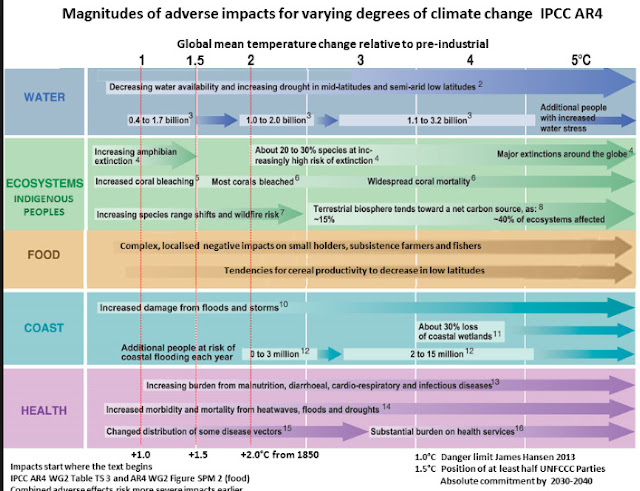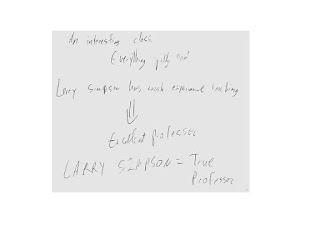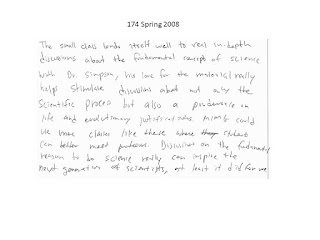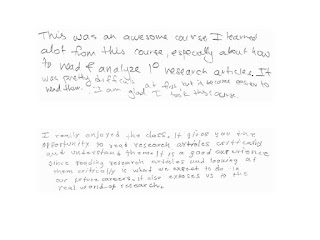The modern Republican Party and its "President",
Donald Trump, have been violently anti-science and have claimed that
human-caused climate change is a "hoax", possibly created by the
Chinese. This was demonstrated in spades by the Republican North Carolina State
Legislature who in 2012 actually passed HB 819, a bill, which legislates state
and local agencies that develop coastal policies to ignore scientific models
showing an acceleration in the rise of sea levels. The driving force for this,
other than the vast stupidity of the Republican Party itself was by NC-20, an
nonprofit governmental group stacked with coastal development and real estate
interests, and the Heartland Institute
and the Competitive Enterprise Institute, which have ties to the fossil fuel
industry. Other idiot - full groups pushing for this legislation include the
Friends of Forestry Political Action Committee, the Heartland Institute, an
ultraconservative “think tank”, the American Legislative Exchange Council and
the Koch Industries, who gave money to several North Carolina legislators.
It reminds me of the famous order by King Canute of Denmark
that the tides should stop. I wish I could ask these legislators now how that
bill is doing with Hurricane Florence and the flooding of the cities.
I copy below a more detailed analysis of this legislation:
From the INDY week newspaper of Raleigh-Durham.
By Lisa Sorg @lisasorg
The agenda behind the sea level rise
bill: from the Carolina coast to the Kochs
Who is NC-20?
Our grandkids will curse us. At a Senate committee hearing
last week, David Rouzer, a Johnston County Republican, ignored the scientific
consensus that by 2100, the sea level could—and most likely will—rise by at
least an average of 3 feet on the North Carolina coast.
Without the proper safeguards, such an increase could be
catastrophic.
Instead, Rouzer and his fellow Republicans passed House Bill
819, which restricts the ability of state agencies to accurately forecast and
prepare for sea level rise. As a result, developers can continue to profit from
building in vulnerable, low-lying coastal areas free of additional regulations
that would apply if the state accounted for higher seas.
"We have to include not only the science," Rouzer
said, "but to consider the reality that if you're going to use the science
but can't validate it, there could be a negative impact on coastal
economies."
However, the science of sea level rise and climate change is
valid and sound. By dismissing the scientific consensus, bill proponents
jeopardize the public health and safety of coastal communities, said Doug
Rader, chief oceans scientist with the Environmental Defense Fund. "It is
forcing the state to use junk science and puts the future of North Carolina's
economy and ecosystems at risk," he said.
This version of the bill made it to the committee after
NC-20, a nonprofit governmental group stacked with coastal development and real
estate interests (see "Who is NC-20?" below), successfully persuaded
a science panel of the Coastal Resources Commission to significantly change its
policy proposal. Those amendments included restricting state and local
governments to using only select historical data to predict sea level rise.
Under those conditions, the forecast is not 3 feet, but 8 inches. On Tuesday, the
full Senate passed the bill, 35-12. It now goes to the House.
"We were really pleased," said NC-20 Chairman Tom
Thompson of Sen. Rouzer, the bill sponsor. "God bless him. He acted like
one of us."
Rouzer's talking points—that the science of climate change
and sea level rise is debatable—mirrored those not only of NC-20, but also of
the rhetoric spouted by right-wing, anti-regulation, climate-change deniers.
Not coincidentally, many of these organizations, including the Heartland
Institute and the Competitive Enterprise Institute, have ties to the fossil
fuel industry,
Thompson was quick to distance NC-20 from those groups.
"We're not guilty by association," he said.
But those associations are real, and they pass through
NC-20's science adviser, John Droz Jr., a former real estate developer with a
master's degree in solid state science (see chart below). A senior fellow at
the American Tradition Institute, which counts among its experts and fellows
many fossil fuel proponents, Droz masterminded a confidential nationwide
strategy to undermine public support for wind power, according to an article in
The Guardian published last month.
"[Droz] advises us," Thompson said. "He
doesn't speak for our whole organization." Droz could not be reached by
Indy seeking comment.
Yet Droz isn't the only member of NC-20 who has championed
the work of climate-change deniers. Larry Baldwin, NC-20's VP of regulatory
affairs, lauded the Heartland Institute on the NC-20 blog, stating he found it
to be "pretty reliable as to factual information." NC-20 has also
posted papers by the late Michael Crichton, a science fiction author and
climate-change denier, who testified before a U.S. Senate committee that global
warming is a hoax.
Nor is North Carolina alone in basing its environmental
policy on political rather than scientific grounds. The Virginia legislature
recently commissioned a $50,000 study to examine the effect of sea level rise
on its coast. According to Think Progress, Republican State Delegate Chris
Stolle cut "sea level rise" from the draft, calling it a
"left-wing term."
Controlling the language—and thus the message—is a strategy
by the right to divert the conversation from their political agenda. Instead
they try to debunk science using "experts" and scientists whose theories
largely have not withstood scientific rigor. It's reminiscent of intelligent
design proponents who, in attempting to insert their theology into science
textbooks, erroneously contend there is a scientific debate over evolution.
"It's already clear from the data that sea level is
accelerating," said Duke University Professor of Global Environmental
Change Rob Jackson, who spoke before the senate committee. He asked that it put
a monthlong hold on the bill to solicit scientific comment. The committee opted
not to postpone its decision.
"There is no scientific schism [about climate change
and sea level rise] at all," Rader said. "This issue is being driven
by non-scientists."
NC-20 has no scientists on its board. But Thompson is quick
to quote "science" to justify its position: It could cost coastal
counties millions of dollars, Thompson said, to prepare for what he believes
will not happen. "It will be a miracle if the sea level rise reaches 39
inches," Thompson said. "If we wait and see, then it costs nothing.
If they're right, then fine."
But coastal residents won't be fine. In addition to the
economic losses in tourism and fishing, the cost to the state to rescue people,
rebuild roads and clean up contaminated drinking water would total in the
hundreds of millions of dollars.
"There's a liability question," Rader said.
"What happens when the state prevents the use of the best available
science in making public policy? If I had bought a home as a result of state
policy and North Carolina told me it was safe to build in these places, I'm
seeking relief, possibly through the courts. All for the advantage of a few
speculators."
________________________________________
Who is NC-20?
"If you want to preserve the beauty of the coastal
counties while ensuring that we use our God-given assets to increase the
quantity and quality of jobs, preserve and increase our tax base, and leave our
children a legacy of prosperity, join NC-20."
That's the sales pitch for the group that successfully
lobbied for a significant change in state environmental policy—one that could
harm future generations of coastal residents.
The board of directors includes 10 county managers and 10
people with development, real estate, insurance and forestry interests. (See
chart below.)
NC-20 Chairman Tom Thompson reports that the group's annual
budget is about $27,000. However, it's difficult to gauge the NC-20's financial
status. According to the group's federal tax returns, it received $13,241 in
memberships and dues in 2009. That amount jumped to $54,644 in the July
2010–June 2011 fiscal year. However, Thompson said the figure is incorrect
because NC-20 bills all the coastal counties but half of them don't pay. (New
Hanover and Brunswick counties, for example, are not members.)
"It's a hope that they'll join," he added. Yet
since these counties were invoiced, the potential revenue must be accounted
for.
Annual membership dues range from $100 for individuals to
$5,000 for businesses (includes a board seat) and up to $10,000 for counties.
NC-20 is an all-volunteer staff. Expenditures include
speaker and lobbyist fees. Thompson said NC-20 paid Fred Bone, ranked as one of
the state's most effective lobbyists (see chart below), $12,000 over eight
months. He reported to the group on committee hearings, Thompson said,
"but he didn't try to influence the legislation. We don't have that kind
of money to pay him for that."
Turning back the tide
Realtor Missy Baskerville was "intimately
involved" in convincing the Coastal Resources Commission to revamp its
policy proposal on sea level rise, according to the NC-20 website.
The Friends of Forestry political action committee has the
same address, 1600 Glenwood Ave., Raleigh, as the N.C. Forestry Association.
Its executive director is Bob Slocum, forestry consultant for NC-20. The
Friends of Forestry gave $1,500 to Republican Sen. David Rouzer, a proponent of
HB 819 (the "sea level rise" bill), and co-chair of the Senate Agriculture/
Environment/ Natural Resources Committee, which passed the measure last week.
From 2012–2012, the PAC also contributed $2,000 to Republican Sen. Brent
Jackson, committee co-chair and $2,000 each to fellow Democratic committee
members, Sens. Clark Jenkins and Michael Walters.
Fred Bone was named one of the Top 10 Most Effective
Lobbyists in 2009–2010 by the N.C. Center for Public Policy Research. Bone
represents not only NC-20, but also tobacco and propane gas interests and the
consumer finance industry.
After receiving his degree in solid state science 37 years
ago, John Droz Jr. became a real estate developer in upstate New York. He is a
senior fellow at the ultra-conservative American Tradition Institute and a
vehement opponent of wind energy. According to a May 8, 2012, story in the
Guardian, Droz masterminded a confidential nationwide strategy to undermine
public support for wind power. The Guardian reported that Droz confirmed he had
"enlisted support for telephone campaigns from Americans for Prosperity
and FreedomWorks," which have received funding from the Koch Brothers.
Droz also appeared at an anti-wind forum sponsored by the John Locke Foundation
in North Carolina last December. Droz has not published any peer-reviewed
scientific articles. On his resume, he says he is a member of Mensa.
Other fellows and experts at the American Tradition
Institute include executive director Tom Tanton, who also was a senior fellow
and vice president of the Institute for Energy Research, a pro-fossil fuels
think tank. Chris Horner, director of litigation for ATI's Environmental Law
Center, is a senior fellow with the Competitive Enterprise Institute (see entry
below). Jenna Ashley Robinson, an ATI research fellow, is outreach coordinator
at the John W. Pope Center for Higher Education Policy, largely funded by the
Pope Foundation, led by North Carolina conservative multi-millionaire Art Pope.
She graduated from the Koch Associates Program sponsored by the Charles G. Koch
Foundation. She was a fellowship assistant at the John Locke Foundation, also
funded by the Pope Foundation.
The Institute for Energy Research has ties to the American
Legislative Exchange Council. It has received $175,000 from Koch Industries,
according to Greenpeace. According to Think Progress, one of IER's directors,
Steven Hayward, was exposed two years ago for offering to pay scientists with
the Intergovernmental Panel on Climate Change $10,000 for written critiques of
the IPCC's newest findings. See also Tom Tanton.
In addition to its advocacy for the tobacco industry, The
Competitive Enterprise Institute opposes environmental regulation and disputes
the scientific facts about climate change. It opposed the 1997 Kyoto Protocol,
which called for the reduction of greenhouse gases. CEI is partially funded by
various Koch Foundations and for seven years received a total of $2 million
from ExxonMobil. See also Chris Horner.
Paul Chesser of Raleigh is a senior fellow at ATI, a special
correspondent at the Heartland Institute and the director of Climate Strategies
Watch. CSW "assesses development of global warming policies in the
states," according to his bio at the John Locke Foundation's Carolina
Journal.
The NC-20 website includes papers and presentations by
Nicola Scafetta, an assistant adjunct professor in the Duke University physics
department. He contends that not human activity, but solar and other
astronomical phenomenon cause climate change. Although climate change deniers
have seized on his series of papers defending this theory, it has been roundly criticized
by the scientific community. The New Scientist reported in 2009 that Scafetta
refused to disclose the computer code he used to reach his conclusions, thus
preventing other scientists from attempting to reproduce his results. He spoke
at the sixth annual Heartland Institute conference on climate change. His work
has also appeared in a book published by the Heartland Institute.
The Heartland Institute, an ultraconservative think tank,
has long led the charge to debunk the science of climate change. Although it
largely keeps its donor list secret, Heartland has received at least $675,000
from ExxonMobil since 1998, $35,000 from the Charles G. Koch Foundation and
hundreds of thousands of dollars from other right-wing groups. The Heartland
Institute is a member of the American Legislative Exchange Council and has
published and promoted ALEC's model legislation. Major supporters of Heartland
recently distanced themselves from the group after it sponsored a billboard
featuring a photo of the Unabomber, Ted Kaczynski, with the words, "I
still believe in global warming. Do you?"
Corporate executives, including those from Koch Industries,
and about 1,500 conservative state legislators belong to the American
Legislative Exchange Council, which designs "model bills" for
like-minded lawmakers to import into their states. These bills, which were
obtained by the Center for Media and Democracy, showed ALEC's work to overturn
environmental protections, including regulations on greenhouse gases. ALEC's
position papers question the impact of humans on climate change. Sen. David
Rouzer attended an ALEC conference last year, according to his campaign finance
reports. He was one of more than 40 N.C. lawmakers who went to the conference;
24 of them sit on one of ALEC's task forces. Reps. Ric Killian and Ruth
Samuelson are on the Energy, Environment and Agriculture task force, along with
representatives from the Institute for Energy Research and the Heartland
Institute.

















































































